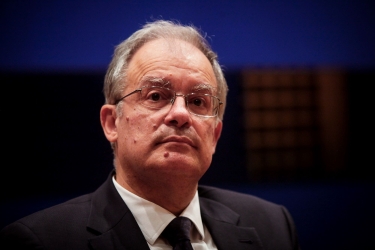President of PGEU O'Loughlin expresses solidarity with Greek pharmacists

O’Loughlin, who’s in Athens for the 1st Conference of Presidents of European Pharmaceutical Associations, spoke about the economic crisis which has led to budget cuts in health, innovative drugs which in many cases are prohibitively expensive, the use of generic drugs, about drug shortages in markets and competition in the health industry, stating categorically that "the care of elderly and sick people is not a sector for harsh economic competition.”
He also expressed his support for Greek pharmacists, explained the ownership status of pharmacies abroad and analysed the role of a pharmacist in society.
1. The 1sth European Pharmaceutical Association Conference is being held with your participation in Athens. This movement can be translated as support towards Greek pharmacists who are struggling constantly the last few years to safeguard their achievements.
The presence of PGEU and of other international pharmacists' organisations is a sincere gesture of support for and of solidarity with our Greek colleagues, who are enduring a very difficult time. We are very pleased to participate in this important event.
2. How has the economic crisis in Europe affected social healthcare?
Across Europe the financial crisis has resulted in austerity policies of varying magnitudes. In many of the programme countries, mine included (I am from Ireland), health budgets have been cut and, consequently, the salaries of health professionals have been cut and health services for citizens have been reduced. Also, in many other countries which were not subject to programmes, health spending has come under pressure and the previous regular yearly increases have been curtailed. This has, in many cases, caused difficulty meeting the increasing demand for health services as populations grow older.
3. (a) In Greece the prevailing opinion is that in the other European countries everything works better. Is this true?
I don’t have sufficient information or experience to judge whether things work better in other countries than in Greece. It is true that, at this time, Greece faces enormous challenges. However, I believe Greeks are determined and resourceful people who have the capacity to solve their problems with the support of European partners. PGEU is here this week to demonstrate our support.
3. (b) Please inform us to which axes the European Pharmaceutical Policy is moving?
European pharmaceutical policy is driven by governments who are increasingly anxious to control spending on health and, in particular, medicines. New innovative medicines have the potential to make a hugely positive difference in the length and quality of patients' lives, and their use has resulted in many previously fatal illnesses becoming treatable. However, in many cases they are prohibitively expensive. Governments are driving down the cost of older medicines and the fees and margins paid to pharmacists to create the possibility to pay for expensive new medicines. In many cases, they are delaying reimbursement decisions on new medicines because the price is considered unaffordable.
In addition, medicines shortages have become a significant and growing problem throughout Europe. As a result of lobbying by pharmacists organisations, governments are beginning to recognise the seriousness of the problem. It is imperative that both national and European agencies actively try to implement solutions to alleviate shortages.
4. (a) The ownership of pharmacies is a major issue for Greeks pharmacists. What is applied to the other European countries? According to your point of view should pharmacies be in the hands of pharmacists or in large business groups?
There are many different pharmacy market structures in Europe, each with its own rules on ownership and establishment of pharmacies. In very many countries, the law requires pharmacies to be owned by pharmacists and prohibits or limits pharmacy chains. Many countries also have restrictions on the establishment of new pharmacy businesses. The European Courts have ruled on several occasions that these rules are entirely legitimate and are permitted under European law as long as they are implemented fairly and the reason for them is to ensure public health and safety and to achieve the rational distribution of pharmacy services.
On the other hand, some countries permit corporate ownership and have allowed the proliferation of large pharmacy chains. I have not seen any evidence that this improves either the quality of pharmacy services available to the public or reduces the costs. I believe that the public is best served by a regulatory and market structure for pharmacy appropriate to the culture of the society, and that puts the professional and personal care of patients and the public above financial gain and shareholder return.
4. (b) Does the competition fits in the Health sector?
Health is not like other sectors of the economy. The care of elderly and sick people is not suitable for raw economic competition and a constant drive by the payer to lower costs, with a competing drive by the supplier to maximise sales and revenues. In healthcare, the focus must always be on meeting the patient’s true needs in a properly structured and supportive manner, in their own community where possible, instead of casting patients at the mercy of a completely commercialized and profit focused health service market.
5. Should OTCs be sold in the supermarkets? Which is the role of the pharmacist?
OTC medicines have an important role in supporting self-care and empowering the public to treat and manage common non-serious ailments. However, they are not ordinary items of commerce and should not be sold in supermarkets or similar outlets. The correct advice and information people get from a pharmacist is essential to ensure safe and appropriate use of OTC medicines by the public. For this reason, most European countries correctly restrict the sale of OTC medicines to pharmacies only.
6. For some time in Greece it is being discussed the increase in consumption of generics. What is your opinion and what is been applied in Europe?
As more and more medicines lose patent protection, there is greater scope for the use of generics. Generic medicines are required by law to be manufactured to the same quality standards as branded medicines and are therefore equally effective and equally safe.
Increasing the use of generics makes medicines more affordable and allows more patients to be treated within the same budgets. Therefore, all across Europe and the world, governments and payers are trying to maximise the use of generic medicines, either by mandating their use or by providing incentives to use them. In some countries, their use has been well established over many years. Other countries have been slower to adopt generics but are now actively promoting their use.
7. What message would you like to pass on to your Greek colleagues, how you will assist them as they have several pending issues
We wish to reassure our Greek colleagues that we stand with them in this time of crisis.
Although the situation in one country is never exactly the same as in another, pharmacists in other countries which have undergone severe financial retrenchment have experience of the struggle to maintain an adequate service and a continuing supply of medicines to patients in periods of austerity and hardship. We offer our Greek colleagues the benefit of that experience and the evidence from our countries which supports the value of the service that community pharmacists provide, to help them protect and advocate for their essential role as the most accessible and most trusted health professionals in primary care. We will also help as much as we can with the efforts at a European level to reach a satisfactory resolution to the many issues they face.
ΔΙΑΒΑΣΕ ΑΚΟΜΗ:
- Βίντεο - σοκ από την πάρασυρση πεζού στο κέντρο της Αθήνας: Τον εκτόξευσε στον αέρα και έφυγε σαν... κύριος
- Άφωνοι οι παρουσιαστές της ΕΡΤ με τα «γαλλικά» της Δήμητρας Παπαδοπούλου στον «αέρα» της εκπομπής: «Αυτά πρέπει να ακούμε» (vid)
- Ξεκάθαρος ο Κολυδάς: «Η φράση "κλιματική κρίση" είναι πολιτική επιλογή, ξεχνάμε ότι πίσω από τα φαινόμενα βρίσκεται ο άνθρωπος» (vid)



